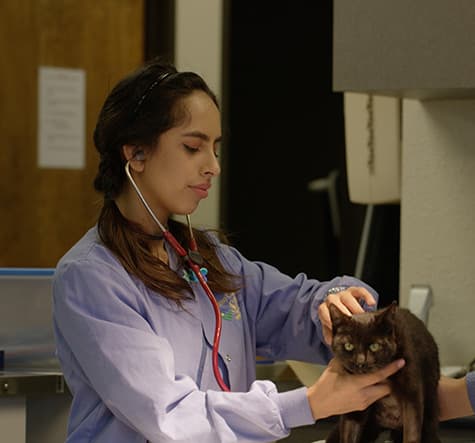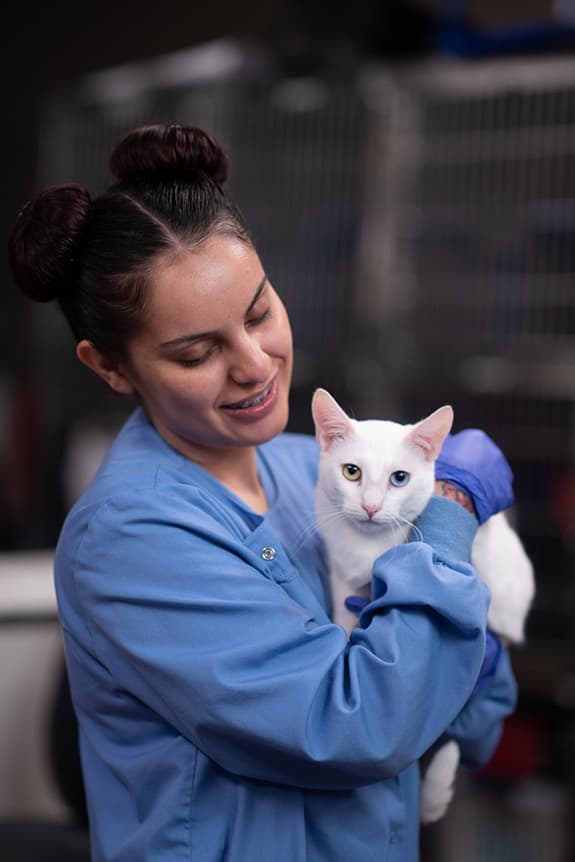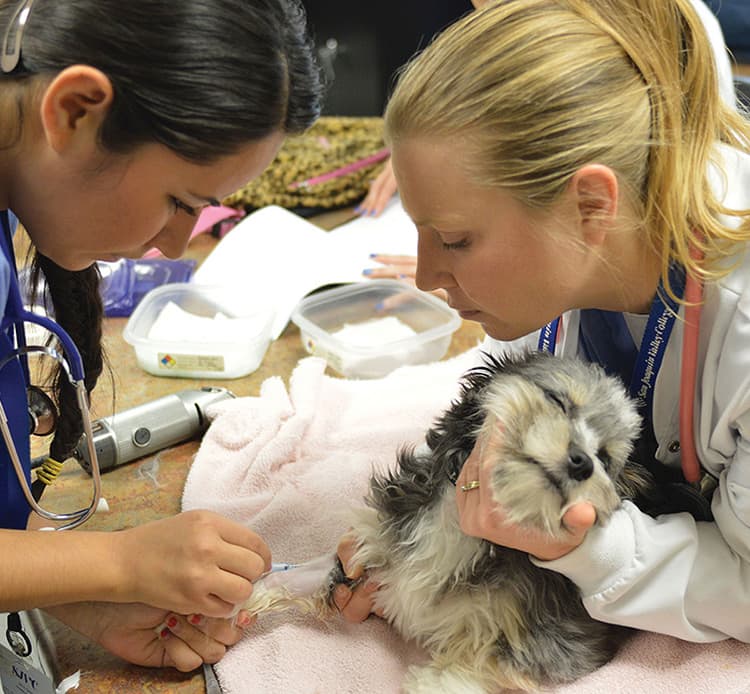Medical and Dental Programs
Veterinary Technology
SJVC’s Veterinary Technology program prepares students to work alongside a veterinarian to perform medical tests to help diagnose animals’ illnesses and injuries. Earn an Associate Degree in as few as 19 months.

REAL-WORLD SKILLS
START YOUR PATH
FLEXIBLE LEARNING OPTIONS
AFFORDABLE TUITION

Program Details
WHAT WILL I LEARN?
At our Ontario location, students will learn how to:
- Calculate dosages, prepare, and dispense medications in compliance with a veterinarian’s orders
- Implement anesthetic plans to facilitate diagnostic, therapeutic, or surgical procedures
- Perform pre-, peri-, and post-operative management of surgical patients
- Perform dental procedures, including a Complete Oral Health Assessment and Treatment (COHAT)
- Perform laboratory tests/procedures and understand the results
- Apply the concepts of animal care and nursing
- Produce diagnostic images and/or radiographs following protocols for quality and operator/patient safety
- Evaluate a patient requiring urgent or emergency care
- Relate and apply concepts of communication, reasoning, critical analysis, ethical behavior, and appropriate interpersonal interaction to situations in his or her career and personal life
- Demonstrate the social skills, professional appearance, attitudes, and behavior that employers expect of all SJVC graduates
Upon completion of this program, the successful student from Ontario will be able to:
- Perform a variety of administrative, clinical, nursing, and surgical assisting procedures in a veterinary medical setting
- Demonstrate the ability to apply critical thinking, collaboration, communication, and professionalism
- Receive hands-on training and participate in an externship. Externship rotations include various animal care environments to give students real-world experience
COST & FINANCIAL AID
Education is the most important investment you can make in your future. There is a financial plan available for everyone, including a broad range of financial assistance options. Visit SJVC’s Net Price Calculator to get personalized information on college costs and financial aid. Check out SJVC’s Academic Catalog to learn about program costs by campus and credential level. You also can talk to an Admissions Advisor to discuss the costs of your chosen program and schedule an appointment with an experienced financial aid officer. Student loans, grants, and scholarships are available to those who qualify.
PROGRAM AVAILABILITY
The Veterinary Technology program is available at the following campuses:
ACCREDITATION & APPROVALS
The Veterinary Technology program on the Ontario campus holds full accreditation by the American Veterinary Medical Association (AVMA).
Committee on Veterinary Technician Education and Activities (CVTEA), American Veterinary Medical Association (AVMA)
1931 N Meacham Rd., Ste. 100
Schaumburg, IL 60173-4360
(847) 925-8070 or (800) 248-2862
www.avma.org
Institutional Accreditation
San Joaquin Valley College is accredited by the WASC Senior College and University Commission (WSCUC), 1080 Marina Village Parkway, Suite 500, Alameda, CA 94501, Phone: 510-748-9001, Fax: 510-748-9797.
www.wscuc.org
The WSCUC is an institutional accrediting body recognized by the Council for Higher Education Accreditation and the U.S. Department of Education.
State Approvals
CALIFORNIA
San Joaquin Valley College is a private institution and is approved to operate as an accredited institution by the California Bureau of Private Postsecondary Education (BPPE). Approval to operate means that San Joaquin Valley College has been found in compliance with the standards set forth in the California Private Postsecondary Education Act of 2009 (as amended) and Title 5, Division 7.5 – Private Postsecondary Education of the California Code of Regulations. As a prospective student, you are encouraged to review this catalog prior to signing an enrollment agreement. You are also encouraged to review the School Performance Fact Sheet, which must be provided to you prior to signing an enrollment agreement.
A student or any member of the public may file a complaint about this institution with the Bureau for Private Postsecondary Education by calling (888) 370-7589 or by completing a complaint form, which can be obtained on the Bureau’s internet website (www.bppe.ca.gov).
View additional State Approvals for San Joaquin Valley College.
What Will I Learn?
Veterinary Nursing
Surgical Assisting Procedures
Perform Laboratory Tests
Veterinary Administrative Operations
Ready to Do This?
Find your path in Veterinary Technology
Talk to an admissions advisor about your options and earn your associate degree in as few as 19 months.
Career Opportunities
Veterinary technologists and technicians are supervised by licensed veterinarians who perform medical tests to help diagnose animals’ illnesses and injuries. Depending on the work environment, a vet tech’s job description may include care, clinical, and laboratory tasks. Additional vet tech responsibilities consist of:1
- Checking the condition of an animal and observing its behavior
- Administering first aid to injured animals
- Grooming animals such as bathing, brushing, cutting hair, and trimming nails
- Restraining animals during exams and procedures
- Prepping animals and equipment for surgery
- Creating and maintaining animal case histories
- Performing diagnostic testing like taking X-rays, laboratory tests, blood counts, and more
Technicians who work with small animal practitioners may help care for a variety of animals such as cats, dogs, rabbits, guinea pigs, and mice. Duties may include administering medications (where permitted), conducting various diagnostic and laboratory tests like heartworm and urinalysis, and recording an animal’s weight, diet, symptoms of illness, and signs of pain.1

Check out our guide on Veterinary Technology in California
If you are interested in joining the world of veterinary medicine, it is time you explore this challenging and rewarding career path. Let’s take a closer look at how you can make a difference in the lives of animals and their families by becoming a veterinary technician in California.

Successful Grads
Ask one of our graduates about their SJVC experience and they’ll likely describe it as life-changing.
Request Information
All fields using an asterik (*) are required.
Veterinary Technology FAQ
How long does it take to become a vet tech?
Do I need to be certified as a vet tech?
Where can I work as a vet tech?
How do you become a veterinary technician?
What degree do you need to be a veterinary technician?
How much is vet tech school?
What is the difference between a vet tech and a vet assistant?
What does a vet tech do?
- Veterinary technicians work with animals under the supervision of a veterinarian. Their job duties may include:1
- Observing the behavior and condition of animals
- Providing nursing care or emergency first aid to recovering or injured animals
- Bathing animals, clipping nails or claws, and brushing or cutting animals’ hair
- Restraining animals during exams or procedures
- Administering anesthesia to animals and monitoring their responses
- Taking X-rays and collecting and performing laboratory tests, such as urinalyses and blood counts
- Preparing animals and instruments for surgery
- Administering medications, vaccines, and treatments prescribed by a veterinarian
- Collecting and recording animals’ case histories
- Talking with pet owners and explaining their pet’s condition or how to administer any treatment or medication prescribed by a veterinarian